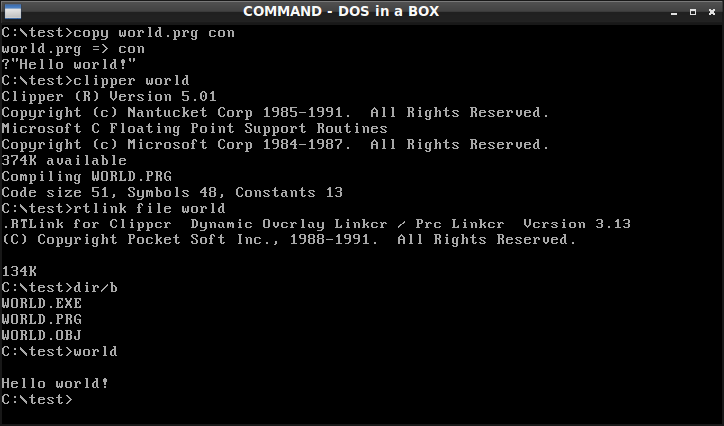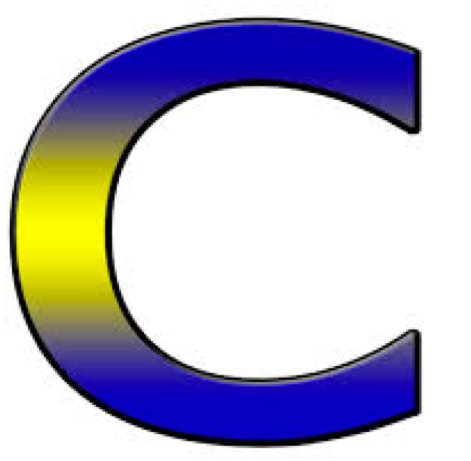Clipper Programming Language Tutorial Pdf
Clipper Tutorial: a Guide to Open Source Clipper(s Clarion is a commercial, proprietary, 4GL, multi-paradigm, programming language and Integrated Development Environment from SoftVelocity used to program database applications. Harbour programming - a manual for beginners, parts I and II. Alexander Kresin software. Harbour for beginners. How to install the Harbour and compile on it your program. Features of the Harbour. Compiler options are backward compatible with Clipper's. The full list of them can be obtained by running harbour.exe without parameters.
- Ruby Programming Language Tutorial Pdf
- Clipper Programming Language Tutorial Pdf
- Clipper Programming Language Download
Description

Developed by Nantucket software and released in winter of 1984, first shipping 25 May 1985 [4].
Clipper was a typical database development language and DOS based. Originally is was used as a replacement programming language for Ashton Tate's DbaseII database environment that could be compiled and executed as a standalone application.
Millions of applications were built typically for businesses dealing with small databases like client management, stock keeping. Many applications for banking and insurance companies were developed were the application was considered too small to be developed and run on mainframes. Clipper often served as a front end exactly for the above mentioned mainframe applications and did very well in this area.
One of the language's features: the possibility to link 'C' and machine language objects made it a virtual unlimited expandable environment. When you missed a feature, an interface or whatever you could program that yourself and the extension made a reusable part of your toolbox. Libraries were also made by third parties but the programmer could also create its own library or enhance the existing ones.
One of the disadvantages, for commercial developers at least, was that a clipper executable could easily be disassembled or de-compiled to produce native source code. There were even commercial packages for that. Between the manufacturers of decompilers and Clipper a covenant was agreed that with a certain code in the source the decompilers would not decompile. But for the hard core hackers no door was kept close.
Around the early 1990's the users felt a need for a more object oriented environment. Nantucket's answer was: Clipper 5.0 up to 5.3. This made the Clipper language more sophisticated, but completely OO it never was. Objects and classes could be created but the language needed more, and quickly, should it keep its programmers corps it had created since 1984.
Too late the Nantucket company realized it had to port the Clipper environment to the Windows platform as well. Too late, or at least the research was not given top priority for research and development. In August 1994 (Shipped December 1995 [4]) a first version became available and was called: Clipper VO (virtual objects) It was truly windows based but had to cope with many typical first issue bugs that were not explained to the full extend. Again programmers had to build new work arounds and did not feel very comfortable with that idea.
The old stock of programmers however had already switched to Visual Basic (Microsoft) and later Delphi (Borland) This came about because many customers with small database environments wanted to upgrade to window versions in their turn pressured by their clients. And as usual clients wanted their applications yesterday!
A second reason why Clipper never got its previous user base back was that the transition to Clipper VO proved to be too complicated for many senior programmers, and juniors already learned to program in Delphi or VB and later Java.
That was a pity because VO proved to be a very powerful and sophisticated database development tool.
Though Nantucket / CA promised a high degree of compatibility with older developments this did not materialize to the degree to make life easier to former Clipper programmers. The result was that programs were rebuilt in the new environments, the best way to do porting actually. Again slimming down the market for Clipper programmers.
In 1995 Computer Associates bought up the Clipper environment, killed the Clipper DOS version and further developed VO. It seemed that CA again did not realize the full potential of Clipper VO and undercut its marketing budget. Thus VO 2.5 is the latest version since 1997
Some of the most eye catching features of VO:[2]
- Fully OO: OLE 2.0, ActiveX
- Multitiered repository
- Internet features: CSMTP and CEmail, Winsock etc.
- Smalltalk like structures
- C++ features
- Interfacing with proprietary databases
- Royalty free distribution of applications
- SQL datafile access
Other developments for Clipper:
Clipper also could be converted to run on UNIX systems by using a porting tool called Flagship. It runs suitably well.
Ruby Programming Language Tutorial Pdf
XBase++ is an OO environment and translates DOS Clipper to Windows but does not enhance the clipper development to an event driven application
Clip-4-Win is a 16 bit compiler and generated character based applications that ran fairly well within Windows.
Clipper Revisited (contributed by Götz Strehl)
Clipper got a new life with the Harbour project.
The harbour-project was started as an open source project in early 1999, the project is still on, but not updated since late 2003.(6)
Out of the harbour-project, xHarbour (extended Harbour) was started by Ron Pinkas late 2001 as a fork off of the Harbour Project in which he was one of the leading developers. xHarbour was established to provide a more aggressive alternative to the conservative style of development in the Harbour Project. This project is up to date and in development until today.(7)
At the end of December 2002, Ron Pinkas and Patrick Mast discussed the idea to establish a corporation, aiming to give xHarbour its appropriate place in main stream development tools, much like Clipper at its high time. The corporation was registered on January 30 2003, in the state of Nevada U.S., as 'xHarbour.com Inc.'. The xHarbour programming language is a superset of the well known xBase language, often referred to as Clipper. xHarbour is 100% backward compatible with the Clipper Language, yet it adds many modern features and tools comparable to today’s leading compilers. Such features include Visual xHarbour (IDE), SQLRDD, xBuild Project Wizard, ActiveX, OLE, RMDBFCDX ( Comix / Clipmore compatible super fast filters), and many more.(8)
Software Update: Verizon Wireless 4G LTE USB Modem 551L Benefits of Software Upgrade (*PDF) Benefits of downloading and installing the new software enhancements. Verizon aircard drivers download usb551l Discover the benefits of the most recent software update available, and view instructions for how to download it to your Verizon Wireless 4G LTE USB Modem Verizon aircard drivers download usb551l Driver For Verizon Aircard Usb551l Driver. Driver for verizon aircard usb551l modem. Windows 10 Users: LG VL600, Pantech UML290, and Verizon 4G LTE USB551L devices are compatible with Windows 10 after applying this workaround. Please select either the Windows or Mac tab below to find your data device.
Clipper is still alive!

Specifications
see above
Chronology
Clipper Programming Language Tutorial Pdf
1984 first issue: Winter 1984
1990 first issue: Clipper 5.0 (distributed at DefCon fall 1990)
1994 first issue of Clipper VO
1997 Clipper VO 2.5
Clipper Programming Language Download
1999 An open source project: Harbour takes up the challenge
Provides a balanced and inclusive approach to religion and politics in the U.S. Arranged in their historical context, chapters address themes of history, law, social and religious movements, policy and political theory. American legal history cases and materials 4th edition. Broadens the parameters of this timely subject, and includes the latest work in the field Draws together newly-commissioned essays by distinguished authors that are cogent for scholars, while also being in a style that is accessible to students. Provides a broad, inclusive, and rich range of chapters, in the study of religion and politics.